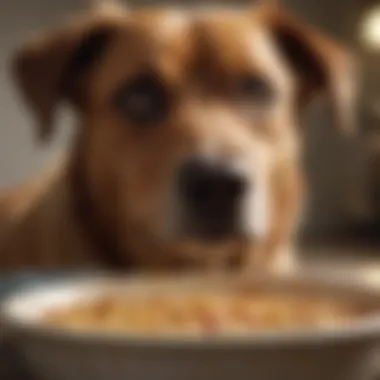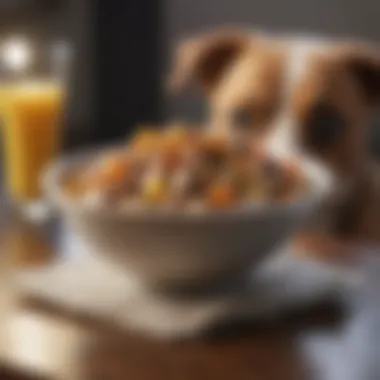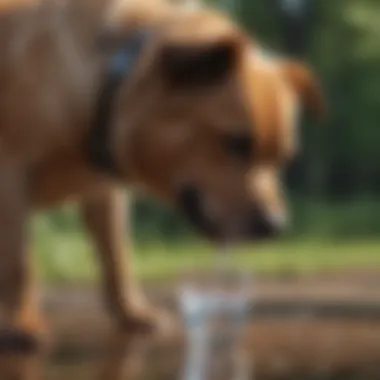Essential Feeding Tips for Dogs with Diarrhea


Intro
Diarrhea in dogs can be an alarming experience for pet owners. It’s not just an inconvenience; it can signal underlying health issues and dehydration. Knowing how to manage your dog's nutrition during such times is crucial. This guide aims to arm you with knowledge about the right feeding practices, making it easier to navigate your dog’s recovery phase.
Understanding Your Pet
When your dog is feeling under the weather, especially with an upset stomach, recognizing their unique characteristics is vital. Dogs are not one-size-fits-all; thus, feeding strategies may vary based on breed, size, and individual temperament.
Breed Traits
Certain breeds may be more prone to digestive issues. For instance, Bulldogs and Dachshunds often face gastrointestinal troubles more frequently than some other breeds. Understanding these traits can help in anticipating potential health problems, leading to proactive measures when diarrhea strikes.
Common Temperaments
Each dog has its own personality. Some may refuse food when feeling ill, while others might be desperate for anything to eat. This temperament can impact how you handle feeding during diarrhea.
Special Needs
Older dogs or those with pre-existing conditions might have special dietary needs. For example, a senior dog struggling with kidney disease may require a completely different approach during diarrhea than a healthy puppy.
Nutrition and Feeding Guidelines
The BRAT Diet
During a bout of diarrhea, the BRAT diet—bananas, rice, applesauce, and toast—comes into play, particularly for dogs. However, you’ll want to modify this to suit canine needs:
- White rice: Gentle on the stomach, helps bulk up stools.
- Boiled chicken: Skinless and shredded, very easily digestible.
- Pumpkin: Naturally high in fiber, it aids digestion.
- Bone broth: Keeps your pup hydrated and offers electrolytes.
A blending of these ingredients can create a simple meal to settle their stomach. Avoid fatty foods or dairy; they can worsen diarrhea.
Hydration is Key
Make sure your dog is drinking plenty of water. Dehydration can become a serious issue. If your dog is reluctant to drink, try offering ice cubes or electrolyte solutions made for pets. This can encourage them to stay hydrated throughout the recovery.
Health and Wellness
When to Consult a Veterinarian
A quick vet visit might save your dog’s day. If diarrhea persists for longer than 24 hours or if you notice vomiting or lethargy accompanying it, don’t wait—speak to a professional. Regular poop checks can also clue you in on your dog's health. If you observe blood in their stool or if the stool is black or tarry, it’s imperative to seek veterinary care immediately.
*“Regular monitoring can prevent small issues from becoming big!
Understanding Diarrhea in Dogs
It’s crucial for dog owners to grasp the ins and outs of diarrhea in their fur babies. This condition can manifest for a plethora of reasons, each with its own intricacies. Understanding the root causes, the symptoms, and the right moments for concern can save a lot of heartache and potential complications. After all, no one likes seeing their beloved pet in discomfort, and knowledge is power.
What Causes Diarrhea?
Diarrhea can stem from a multitude of sources. Sometimes it’s as simple as a dietary indiscretion. Picture your pup munching on something they shouldn’t have, like that half-eaten sandwich left on the countertop. Other times, a specific food ingredient could set off a digestive reaction due to allergies or intolerances.
Infections are another common culprit. Bacterial or viral pathogens can wreak havoc on a dog's intestinal system, resulting in loose stools. Sometimes, parasites like giardia or roundworms join the party. Severe conditions, such as inflammatory bowel disease or pancreatitis, may also cause episodes of diarrhea. As you see, this broad spectrum of causes necessitates a detailed understanding to tackle the issue effectively.
Symptoms and Signs
When it comes to recognizing diarrhea, it’s not just about the obvious watery stools. Paying attention to your dog’s overall behavior is equally significant. You might notice them feeling lethargic or displaying signs of discomfort. Vomiting may also accompany diarrhea, compounding the concern for any owner.
Other symptoms to watch for include:


- Frequent trips outside: An increase in urgency to relieve themselves can indicate an upset stomach.
- Change in appetite: A dog may refuse food or seem uninterested in their favorite treats.
- Dehydration signs: Keep an eye out for dry gums or sunken eyes, which are red flags that your pup may need immediate attention.
When to Be Concerned
Not all diarrhea episodes are created equal. While some can be managed at home, others demand immediate veterinary intervention. If your dog shows continued signs of diarrhea for more than 24 hours, it’s definitely time to consult with a veterinarian. Additional indicators warranting concern include:
- Presence of blood: Seeing blood in stool can be alarming and suggests a potential serious condition.
- High fever: Elevated body temperature accompanying diarrhea raises the stakes.
- Persistent vomiting: If your dog can’t keep anything down alongside diarrhea, it is critical to seek help.
Remember: Always trust your instincts as a pet owner. If something doesn’t feel right, it’s better to check in with a vet. Your dog relies on you for their health and well-being.
In summary, understanding diarrhea in dogs goes beyond just recognizing loose stools. It encompasses identifying the underlying issues, noticing associated symptoms, and knowing when to act. This foundational knowledge equips pet owners to respond more effectively when a diarrhea episode strikes.
Nutritional Needs During Diarrhea
When your dog is facing the discomfort of diarrhea, the spotlight shifts to the nutritional needs that can support recovery. Proper diet not only aids in the healing process but also helps maintain overall health. Ignoring dietary needs during this vulnerable time could lead to prolonged recovery and additional complications.
The Role of Diet in Recovery
Diet plays a critical role in getting your dog back on its feet after bouts of diarrhea. The right food can help to restore digestive balance and ensure essential nutrients are absorbed. It's not just about what goes in, but also how the digestive system reacts to these foods.
When dogs suffer from diarrhea, their bodies often become depleted of important vitamins and minerals. Therefore, foods that are easy to digest and mild on the stomach become crucial.
Some key components of a recovery diet include:
- Low-fat Proteins: Options like boiled chicken or turkey without skin help provide proteins without upsetting the stomach further.
- Easily Digestible Carbs: Ingredients such as white rice or plain mashed potatoes provide energy while being gentle on the gut. They also help firm up stool.
- Fiber Sources: Adding small amounts of plain pumpkin or sweet potatoes can help regulate bowel movements.
While it might itch your curiosity to throw in a range of fancy additions, simplicity is often better during this phase.
Hydration: Essential Considerations
An often overlooked aspect of nutritional needs is hydration. Diarrhea is a thief that robs your dog of fluids, leading to potential dehydration, which can further complicate recovery. It is essential to keep their water bowl filled, but sometimes that may not be enough.
Here are a few hydration tips to consider:
- Electrolyte Solutions: Special dog-safe electrolyte solutions can help replenish lost fluids and minerals.
- Broth: Warm, low-sodium chicken or beef broth can encourage drinking while also providing nutrients. Just be cautious of any onion or garlic in the mix.
- Frequent Small Sips: Instead of allowing them to gulp down big quantities, offer smaller amounts throughout the day. This approach is gentler on the stomach.
Monitoring their drinking habits is just as crucial as tracking food intake. Observe if your dog seems lethargic or refuses to drink. These can be signs your pup needs professional veterinary guidance.
Balancing Nutritional Requirements
Striking a balance between essential nutrients while your dog is recovering can feel like walking a tightrope. On one side, you have the need for nutrients, and on the other, the risk of irritating an already sensitive stomach. The key here is to focus on balance over abundance.
Consider the following when planning your dog’s meals during recovery:
- Portion Sizes: Smaller, more frequent meals tend to sit better than large quantities at once. This way, your dog can digest without feeling overwhelmed.
- Supplementation: If you're concerned your dog isn't getting enough nutrients from food alone, consult your vet about safe supplements, like probiotics or additional vitamins.
- Monitor Their Progress: Keeping a keen eye on how your dog reacts to their meals can signal what works or doesn't. Changes in stool consistency, energy levels, or any adverse reactions should be documented.
Remember: Every dog is unique. What works for one may not work for another. Listen to your dog’s body and consult a vet if in doubt.
Feeding Options When Your Dog Has Diarrhea
When a furry friend is faced with diarrhea, choosing the right feeding options becomes critical. It’s not just about filling their bowl; it’s about providing the nutrition that can aid recovery and comfort. With an upset stomach, the wrong foods can aggravate the problem and lead to more distress. Thus, understanding the landscape of feeding during such times is key for every dog owner.
Successful Homemade Diets
Creating a homemade diet during recovery doesn’t have to be rocket science. Three common yet effective recipes can provide dogs with the necessary nutrients while being gentle on their tummies.
Rice and Chicken Recipe
This classic combination is often the go-to for pet owners when their dogs are unwell. The softness of the boiled chicken and plain white rice offers easily digestible proteins and carbohydrates. It’s an ideal blend with very little fat content, making it a beneficial choice for dogs recovering from diarrhea.
One unique feature of this meal is its simplicity. You can whip it up quickly without fancy ingredients. However, it might not provide all necessary nutrients if fed long-term, so it’s best used as a temporary solution while your dog's stomach settles.


Pumpkin and Plain Yogurt Blend
Pumpkin offers fiber that can help firm up stool and is a beneficial addition to a dog’s diet when diarrhea strikes. When combined with plain yogurt, which contains probiotics, it supports good gut health. This blend is particularly popular among pet owners because it’s not only nutritious but also palatable.
The unique feature here is the balance of fiber and probiotics that work together to soothe an upset stomach. However, it’s important to steer clear of flavored yogurts or those with added sugars, as they can do more harm than good.
Sweet Potato and Fish Meal
Sweet potatoes provide a different kind of fiber that’s also gentle on the digestive system. When mixed with fish, a protein source that’s often easier for dogs to digest, it creates a wholesome meal that supports recovery while being rich in vitamins. This dish stands out as a beneficial option due to its varied nutrients and energy-boosting effects.
While both ingredients are generally well-accepted by canines, it’s wise to observe your dog for any signs of adverse reactions.
Commercial Diets to Consider
For those who prefer ready-made options, several commercial diets cater to sensitive stomachs. They are specially formulated to meet the needs of dogs with digestive troubles and provide the nutrients necessary for recovery.
Veterinary Prescription Diets
Consulting a vet can lead to the identification of specific prescription diets designed for digestive upset. These diets are often created with unique formulations that support gut health and address the underlying problems leading to diarrhea. The key characteristic of these diets is that they are tailored specifically for individual pets, considering health conditions or allergies.
A distinct advantage is their scientific backing, but they may come with a hefty price tag. Additionally, some dogs can be picky when it comes to flavor and texture, and they may not take to these diets as quickly.
Store-Bought Sensitive Stomach Formulas
Available at most pet stores, some brands offer sensitive stomach recipes that include easily digestible ingredients. These are typically favored for their accessibility and convenience.
The advantage of these products is variety; they come in multiple flavors, making it easier to find an option your dog will like. However, the quality can vary greatly across brands, so it’s important to read labels carefully to avoid any unwanted additives.
High-Quality Grain-Free Options
Grain-free diets have made their way into the mainstream as a response to potential food sensitivities. These foods often include ingredients such as peas or potatoes in place of grains, which some dog owners believe are easier on sensitive stomachs. Here, the key characteristic is the focus on high-quality proteins and limited ingredient lists which may aid in recovery.
While many dogs thrive on these diets, it’s crucial to monitor for any allergies or intolerances. Each dog is unique, and a sudden diet change can cause its own set of problems, especially if the introduction is rushed.
Feeding Techniques and Tips
When a dog is facing the discomfort of diarrhea, what and how you feed them becomes crucial to their recovery. Understanding the proper feeding techniques can significantly influence a pet’s strength to bounce back from gastrointestinal distress. In this section, we will explore key methods to ensure your dog receives the nutrition they need while also making the feeding process as smooth as possible during this uncomfortable time.
Gradual Reintroduction of Food
After a bout of diarrhea, it's vital to ease your dog back into their regular diet. Jumping straight into their usual eating habits can overwhelm their sensitive stomachs. Instead, consider a gradual reintroduction of food that allows their digestive system to adjust. Start with small portions of bland food, like boiled rice mixed with a protein source such as chicken or lean fish.
Here are some steps you can follow:
- Begin with a bland diet: The classic rice and chicken combo is a favorite because it’s gentle on the stomach.
- Serve smaller portions: Offer a few tablespoons at first, and wait to see how your dog responds.
- Monitor for signs of distress: If there’s no relapse into diarrhea after about 12 hours, you can increase the portion gradually.
- Introduce regular food slowly: After a day or two of their bland diet, start to mix their regular food back in, upping the regular food until it completely replaces the bland diet over several days.
Monitoring Portion Sizes
Keeping a close eye on portion sizes is another essential aspect in the feeding process after diarrhea. As a responsible pet owner, it’s your duty to ensure your pup isn’t overeating, which can lead to further digestive issues. Measure food carefully, especially when you are bringing back their regular diet.
You might want to consider the following points:
- Follow guidelines on the packaging: Every dog has unique needs based on their size and breed. Be sure to consult the recommended feeding amounts on their food label.
- Adjust as necessary: If your dog has experienced weight loss due to diarrhea, you may need to slightly increase portions, but still do so cautiously.
- Frequent small meals: Instead of one or two large meals, try breaking their feeding into smaller portions throughout the day. This method can reduce strain on their digestive system and help them regain strength.
Maintaining a Calm Environment
The emotional state of your dog can greatly impact their ability to recover from diarrhea. Stress can exacerbate digestive issues, so creating a calm feeding environment is paramount. A few practical tips can make all the difference:
- Choose a quiet space: Set up their feeding area away from distractions like loud noises, other pets, or busy family activities. A serene atmosphere encourages relaxation.
- Establish a routine: Dogs thrive on routines. Regular feeding times create stability, which can help ease anxiety during this tough time.
- Stay present: When feeding, pay attention to your dog. Offer gentle encouragement but avoid using excessive excitement, as this could agitate them.


Maintaining a calm environment is key to fostering recovery in dogs with diarrhea. A quiet space can soothe anxious pups, ensuring they eat and hydrate properly.
Feeding a dog recovering from diarrhea requires a gentle blend of care and attentiveness. By gradually reintroducing food, monitoring portion sizes, and maintaining a calm atmosphere, you’re not just helping them recover, but you’re also showing that you care deeply for their well-being.
Consulting a Veterinarian
Consulting a veterinarian when your dog is experiencing diarrhea is not just a good idea—it can be vital for ensuring your pet's health. In many cases, diarrhea could be a sign of a more serious underlying issue. Whether it's a dietary indiscretion or something more sinister, a vet’s expertise can help you navigate these troubled waters. Pet owners often underestimate how compliance with a vet’s recommendations can lead to speedy recovery and prevention of more severe health problems down the line.
One major advantage of consulting a veterinarian is that they can help you identify severe symptoms. Rather than just relying on your observations, a vet can perform a thorough assessment to determine if the situation is critical. This may include physical examinations and lab tests to rule out infections, parasites, or systemic diseases. Some severe symptoms to watch out for include:
- Blood in the stool
- Persistent vomiting
- Lethargy or weakness
- Extreme dehydration
Identifying these red flags can make a world of difference in your dog's health outcome.
Identifying Severe Symptoms
Knowing when to reach out to a vet is crucial. What may seem like a minor stomach ache could escalate quickly into something much more serious. Some symptoms that should raise an alarm include:
- Frequent diarrhea, especially if watery: This could lead to serious dehydration, particularly in smaller breeds.
- Accompanying fever or loss of appetite: These are signs that your dog might be fighting off an infection or illness.
- Bloating or discomfort: If your dog seems unusually uncomfortable or if its abdomen is swollen, it’s best to consult a professional.
Recognizing these symptoms opens the door to effectively managing your dog's condition.
Understanding Diagnostic Tests
Once you've consulted a vet, they may suggest some diagnostic tests to pinpoint the underlying cause of your dog's diarrhea. These tests can include:
- Fecal examination: To check for parasites or bacteria.
- Blood tests: To assess organ function and identify infections.
- Ultrasound or X-rays: These imaging techniques can help rule out blockages or abnormalities in your dog's digestive tract.
These tests not only guide treatment but also provide a framework for understanding what led to your pet's distress. It’s an important step in ensuring that any treatment approach is appropriate and tailored for your dog.
Treatment Options from Your Vet
After diagnosing the issue, your vet will likely present a set of treatment options. General treatment protocols may include:
- Medications: Anti-diarrheal medications or antibiotics may be prescribed based on the diagnosis.
- Special diets: Your vet might suggest easily digestible foods or specialized diets to help your dog's digestive system recover.
- Fluid therapy: In cases of severe dehydration, intravenous fluids may be necessary to restore hydration levels.
Above all, don’t overlook the importance of following your vet's guidance. The approaches tailored by a professional vet can be crucial in aiding your dog's recovery. As a pet owner, understanding these factors can enrich your ability to respond effectively in challenging situations.
Preventive Measures for Future Incidents
When it comes to our furry companions, it’s invaluable to think ahead. Preventive measures can be the difference between an occasional upset stomach and recurring digestive issues. By establishing a proactive approach to your dog’s diet and health, you can greatly reduce the chances of diarrhea becoming a frequent visitor in your household.
Maintaining a Consistent Diet
Dogs thrive on routine, and this includes their meals. A consistent diet helps stabilize their digestive system, allowing it to function smoothly. Switching foods too abruptly can upset your dog’s stomach. If you think a change is necessary, do it gradually. Transitioning from one food to another should take about a week. Start by mixing a small amount of new food with the old, gradually increasing the proportion of the new food while decreasing the old.
- Choose high-quality dog food that matches your pet's age and health requirements.
- Stick to established feeding times, preventing scavenging throughout the day.
- If you decide to introduce new foods, choose bland options like boiled chicken or plain rice, as these can help ease the digestive system.
Recognizing Allergies and Intolerances
Just like humans, dogs can have allergies or intolerances to certain food ingredients that can lead to digestive upsets. Identifying what sets off these reactions is critical. Some common culprits include wheat, corn, and certain proteins like beef or chicken. If your dog shows signs of irritation such as itching, vomiting, or diarrhea after eating a particular food, that’s a signal something isn’t right.
To pinpoint potential food problems:
- Keep a food diary to monitor what your dog eats and any symptoms that arise.
- Consider conducting an elimination diet under the guidance of a veterinarian to identify any allergens.
- If you suspect a food intolerance, it might be worth consulting your vet about hypoallergenic dog foods that could work better for your pet.
Regular Health Check-Ups
Routine veterinary visits are essential, not just when problems arise. Regular health check-ups can help catch potential issues before they escalate. Your vet will not only keep track of your dog’s overall health but can proactively monitor any signs of dietary issues or diseases. Vaccinations and parasite control are also integral parts of preventive health care.
- Schedule annual exams to assess your dog's health and discuss any dietary changes.
- Ensure your dog is up to date on vaccinations and preventative medications. This can catch issues like parasites that may contribute to diarrhea.
- Keep an eye on your dog’s weight and energy levels; unforeseen loss of weight or lethargy can be a red flag that warrants immediate attention.
"Prevention isn’t just better than cure; it’s the key to a long, healthy life for your pet."
By being vigilant with these preventive measures, not only can you help avoid the unpleasantness of diarrhea, but you can also contribute to a healthier, happier life for your furry friend.



